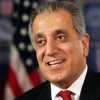Zalmay Khalilzad

Zalmay Khalilzad
Zalmay Mamozy Khalilzadis a U.S. counselor at the Center for Strategic and International Studiesand president of Khalilzad Associates, an international business consulting firm based in Washington, D.C. He was the United States Ambassador to the United Nations under President George W. Bush. He has been involved with U.S. policy makers at the White House, State Department and Pentagon since the mid-1980s, and was the highest-ranking Muslim American in the Administration of U.S. President George W. Bush. Khalilzad's previous assignments in...
NationalityAmerican
ProfessionPolitician
Date of Birth22 March 1951
CountryUnited States of America